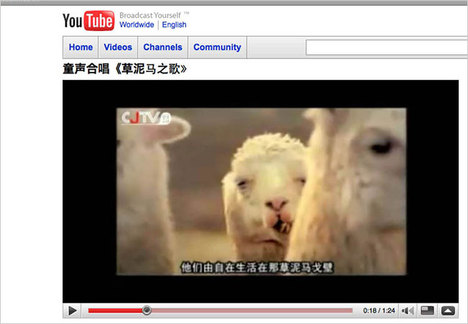 “Songs about a mythical alpaca-like creature have taken hold online in China.” Source of screen capture and caption: online version of the NYT article quoted and cited below.
“Songs about a mythical alpaca-like creature have taken hold online in China.” Source of screen capture and caption: online version of the NYT article quoted and cited below.
(p. A1) BEIJING — Since its first unheralded appearance in January on a Chinese Web page, the grass-mud horse has become nothing less than a phenomenon.
A YouTube children’s song about the beast has drawn nearly 1.4 million viewers. A grass-mud horse cartoon has logged a quarter million more views. A nature documentary on its habits attracted 180,000 more. Stores are selling grass-mud horse dolls. Chinese intellectuals are writing treatises on the grass-mud horse’s social importance. The story of the grass-mud horse’s struggle against the evil river crab has spread far and wide across the Chinese online community.
Not bad for a mythical creature whose name, in Chinese, sounds very much like an especially vile obscenity. Which is precisely the point.
The grass-mud horse is an example of something that, in China’s authoritarian system, passes as subversive behavior. Conceived as an impish protest against censorship, the foul-named little horse has not merely made government censors look ridiculous, although it has surely done that.
It has also raised real ques-(p. A12)tions about China’s ability to stanch the flow of information over the Internet — a project on which the Chinese government already has expended untold riches, and written countless software algorithms to weed deviant thought from the world’s largest cyber-community.
For the full story, see:
MICHAEL WINES. “Mythical Beast (a Dirty Pun) Tweaks China’s Web Censors.” The New York Times (Thurs., March 12, 2009): A1 & A12.
(Note: the online title of the article is: “A Dirty Pun Tweaks China’s Online Censors.”)
 “The popularity of the grass-mud horse has raised questions about China’s ability to stanch the flow of information.” Source of screen capture and caption: online version of the NYT article quoted and cited above.
“The popularity of the grass-mud horse has raised questions about China’s ability to stanch the flow of information.” Source of screen capture and caption: online version of the NYT article quoted and cited above.

